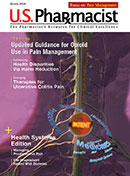Edinburgh, Scotland—The worldwide novel coronavirus (2019-nCoV) outbreak is presenting major challenges for clinicians.
A commentary in The Lancet points out, “The clinical course of patients remains to be fully characterized, little data are available that describe the disease pathogenesis, and no pharmacological therapies of proven efficacy yet exist.”
In fact, the World Health Organization has recommended against treating the acute respiratory illness with corticosteroids, which were widely used during the outbreaks of severe acute respiratory syndrome (SARS)-CoV and Middle East respiratory syndrome (MERS)-CoV, unless indicated for another reason.
“A systematic review of observational studies of corticosteroids administered to patients with SARS reported no survival benefit and possible harms (avascular necrosis, psychosis, diabetes, and delayed viral clearance),” the WHO said in recent guidance.
Steroids should still be used for conditions such as asthma and other inflammatory diseases, commentary authors from the University of Edinburgh emphasize.
Use of the drugs during the SARS and MERS outbreaks, which were caused by coronaviruses, appeared to be logical, according to the article, because lung inflammation was observed. Yet steroids also can impair the immune system’s ability to fight viruses and other infections, which is what led to the WHO recommendations.
“During this current coronavirus outbreak clinicians are faced with some tough decisions on how to treat people who have been infected,” noted lead commentary author J. Kenneth Baillie, MBChB, PhD. “After looking carefully at what evidence is available, we would advise that steroids should not be used for treatment of lung injury caused by this new virus. If steroids are used, it should be as part of a clinical trial so that we can find out if they are helping or harming patients.”
Interim guidance from the WHO, entitled “Clinical Management of Severe Acute Respiratory Infection When Novel Coronavirus (2019-Ncov) Infection is Suspected,” recommends administering empiric antimicrobials to treat all likely pathogens causing SARI.
It also urges that the antimicrobials be given within 1 hour of initial patient assessment for patients with sepsis.
“Although the patient may be suspected to have nCoV, administer appropriate empiric antimicrobials within ONE hour of identification of sepsis,” according to the document. “Empiric antibiotic treatment should be based on the clinical diagnosis (community-acquired pneumonia, health care-associated pneumonia [if infection was acquired in healthcare setting], or sepsis), local epidemiology and susceptibility data, and treatment guidelines. Empiric therapy includes a neuraminidase inhibitor for treatment of influenza when there is local circulation or other risk factors, including travel history or exposure to animal influenza viruses. Empiric therapy should be de-escalated on the basis of microbiology results and clinical judgment.”
« Click here to return to Weekly News Update.
A commentary in The Lancet points out, “The clinical course of patients remains to be fully characterized, little data are available that describe the disease pathogenesis, and no pharmacological therapies of proven efficacy yet exist.”
In fact, the World Health Organization has recommended against treating the acute respiratory illness with corticosteroids, which were widely used during the outbreaks of severe acute respiratory syndrome (SARS)-CoV and Middle East respiratory syndrome (MERS)-CoV, unless indicated for another reason.
“A systematic review of observational studies of corticosteroids administered to patients with SARS reported no survival benefit and possible harms (avascular necrosis, psychosis, diabetes, and delayed viral clearance),” the WHO said in recent guidance.
Steroids should still be used for conditions such as asthma and other inflammatory diseases, commentary authors from the University of Edinburgh emphasize.
Use of the drugs during the SARS and MERS outbreaks, which were caused by coronaviruses, appeared to be logical, according to the article, because lung inflammation was observed. Yet steroids also can impair the immune system’s ability to fight viruses and other infections, which is what led to the WHO recommendations.
“During this current coronavirus outbreak clinicians are faced with some tough decisions on how to treat people who have been infected,” noted lead commentary author J. Kenneth Baillie, MBChB, PhD. “After looking carefully at what evidence is available, we would advise that steroids should not be used for treatment of lung injury caused by this new virus. If steroids are used, it should be as part of a clinical trial so that we can find out if they are helping or harming patients.”
Interim guidance from the WHO, entitled “Clinical Management of Severe Acute Respiratory Infection When Novel Coronavirus (2019-Ncov) Infection is Suspected,” recommends administering empiric antimicrobials to treat all likely pathogens causing SARI.
It also urges that the antimicrobials be given within 1 hour of initial patient assessment for patients with sepsis.
“Although the patient may be suspected to have nCoV, administer appropriate empiric antimicrobials within ONE hour of identification of sepsis,” according to the document. “Empiric antibiotic treatment should be based on the clinical diagnosis (community-acquired pneumonia, health care-associated pneumonia [if infection was acquired in healthcare setting], or sepsis), local epidemiology and susceptibility data, and treatment guidelines. Empiric therapy includes a neuraminidase inhibitor for treatment of influenza when there is local circulation or other risk factors, including travel history or exposure to animal influenza viruses. Empiric therapy should be de-escalated on the basis of microbiology results and clinical judgment.”
« Click here to return to Weekly News Update.





